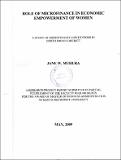| dc.description.abstract | The study intended to examine the role of microfinance in economic empowerment of women. The major aim of microfinance institutions is to provide financial services to the poor and marginalized members of the community like women. Women produce 80% of food consumed in Sub-Saharan Africa, 50-60% of all staples in Asia, and generate 30% of all food consumed in Latin America [Saito 1994].There's a growing recognition internationally that gender equality is good for economic growth and essential for poverty reduction [Ellis 2004]. Women in Kenya are poorer than men, with 54% of rural and 63% of urban women and girls living below the poverty line [Government of Kenya 1997]. Women in Kenya are also "time-poor" because of their dual roles in the household economy and the labour market. On average, women work longer hours [12.9 hours] compared with those of men (8.2 hours], yet they earn less because more of these hours are not remunerated [Saito, Mekonnen, and Spurling 1994] However, women remam disadvantaged, especially in the poorest countries. Their opportunities for educational, social, and economic advancement are usually markedly inferior to those of men. They often face barriers in gaining access to good education and health care for both economic and cultural reasons like early forced marriages. Micro:finance came into being with an aim of providing high quality financial services to the Kenyan public particularly the poor and to maintain high moral and financial standards in the Microfinance sector. According to Microfinance Directory [2007], Association of micro finance Institutions [ AMFI] was registered in 1999, and is currently composed of a total clientele of over 2 million clients and an outstanding loan portfolio of Ksh. 20 billion. Sisdo, Bimas, K-Rep, and Kenya Women Finance Trust [K.W.F.T] are among the 33 MFis and have branches in North Imenti District where the study was carried. I choose them because they are registered as required by law. | en_US |

